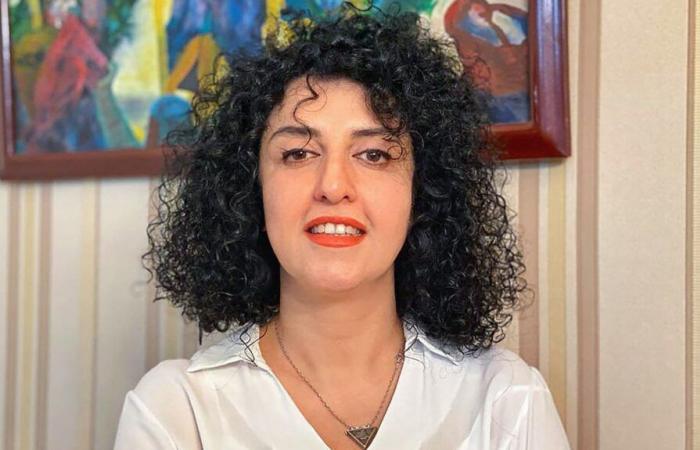
For a month, Iranian activist and journalist Narges Mohammadi has been free. The 2023 Nobel Peace Prize winner was temporarily released from prison on medical grounds, notably due to the removal of a tumor. Narges Mohammadi, who has been fighting for more than 25 years against the compulsory veil and for women’s rights, was imprisoned in a jail in Tehran, capital of the Islamic Republic. But his fate still remains uncertain, while the Nobel committee and the UN call for his definitive release. Franceinfo interviewed his lawyer, Chirinne Ardakani, also a member of the Iran Justice collective, on Saturday January 4.
franceinfo: What is the situation in Narges currently? She is temporarily free, but is this a reprieve?
Chirinne Ardakani : First of all, we must understand that this is a permission for medical reasons. On the other hand, it is neither a measure of clemency nor a measure of favor. This temporary release is linked to his state of health. The judicial doctor authorized a 3-week leave from December 4 following a surgical procedure. A tumor was detected late in his right leg and it was the delay in treatment that required surgery last month. If this intervention was delayed, it is because Narges refused to be transferred under the conditions imposed by the regime which made her transfer conditional on wearing the veil.
Initially, it was a leave of 21 days, while the medical advice said three months minimum. When this permission ended on December 25, we requested again, through his Iranian lawyer, the extension of this first permission. For a few days, local authorities were closed due to air pollution in Tehran. Therefore, certain services, including the one responsible for ruling on this extension request, are currently closed.
We have entered a phase of legal uncertainty since, officially, she is supposed to return to prison. For the moment, his fate is uncertain. But above all it is in the very arbitrary hands of the authorities who must decide on this extension.
What can she do with this supervised and temporary freedom?
She is free to move around even though normally, she should have already returned to her prison. As we are in a dictatorship in Iran, it is obvious that it is under surveillance. His home is under surveillance. She is free to move, but she cannot leave the territory. She is free to speak, but sparingly. She has carried out a few interviews, but knowing that every time she speaks to the press, that she criticizes the Islamic Republic, so many charges accumulate on her file. She is the subject of legal harassment which means that every month or so, she has new charges against her. As soon as she speaks, she pays the price. She has already been sentenced to more than thirteen years in prison.
“Many Iranian activists and Iranian civil society come to see her or talk with her. They thank her for her efforts and come to express their solidarity more or less clandestinely, because we must understand that each person who comes to visit her is monitored. This is the Islamic Republic.”
lawyer Chirinne Ardakaniat franceinfo
How do you explain this strength of his? When she came out of prison in December, she shouted “women, life, freedom”?
What she is saying is that life must prevail despite the Islamic Republic. Death is what this regime is sowing, with extremely strong repression of the women, life, freedom movement. She also says it in her interview for the magazine Elle (published January 2). Narges describes to what extent the political prison, the women’s section of this political prison, is a place of violence, a place where the continuation of dictatorial power is exercised. It is a place where political prisoners are subjected to sexual violence, white torture in solitary confinement, where detainees are dehumanized. And she says that despite this repressive operation by the Islamic Republic, political prisoners continue to organize themselves to have some semblance of normalcy in their lives. They dance, they sing, they fight, for example to have access to books, to a library.
When she had these first words, “women, life, freedom”, she wanted to show her tormentors that no, they had not succeeded in breaking this state of mind of resistance and life. It’s a striking contrast: she appears on a stretcher, she comes out of an ambulance and despite everything, she gives the image of a woman who refuses to give in and who appears combative.
Does she think that the mullahs’ regime is more fragile today, after what happened in Syria?
I can’t speak for Narges Mohammadi, but I have spoken with her over the past few days. She is convinced that this movement, like all those that have spread through Iranian society in recent decades, will ultimately succeed. Obviously the road is long and it does not neglect the strength of this regime which is a violent regime, with this military apparatus and fanaticized militiamen. But nevertheless, it is a regime that is weakened both internationally. Today’s sequence is not favorable for the Islamic Republic, but above all because something has truly changed profoundly in Iranian society.
“The generation of those who pay for this terrible repression, with continued hangings, has its own martyrs. This has deeply shocked a part of the population who, truly, has broken with the Islamic Republic. This is a factor of hope.”
lawyer Chirinne Ardakaniat franceinfo
What message does she want us to take away from this commitment?
Narges Mohammadi’s message is that the gender apartheid that is prevalent in Iran and Afghanistan must be criminalized in international law. That is to say, we must put in place a human rights diplomacy, a feminist diplomacy which ensures that states like that of the Islamic Republic, like that of the Taliban, which ignore the women’s rights. What Narges Mohammadi says is that there is no democracy possible when we subject women to laws of domination, or which deny their fundamental rights.
The takeover of power in Syria by a certain number of groups which are, despite everything, Islamist groups, must worry us. The Islamic Republic, in 1979, when it took power, made the whole world believe that it was possible to achieve democracy. However, democracy is never possible when we have groups who confuse religious law and civil law and who, ultimately, attack women’s rights.





